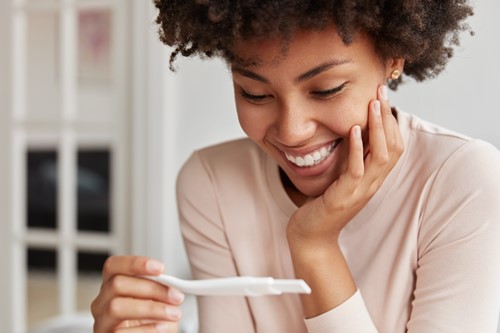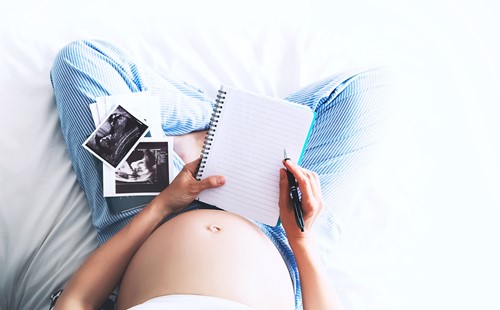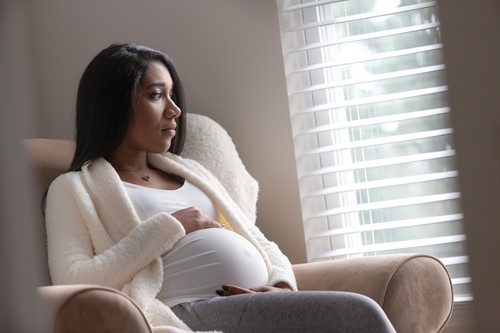Advice for new mums about body changes and periods.
If you're reading this, then you're probably expecting a little bundle of joy soon. Congratulations!
Pregnancy is an exciting journey filled with lots of new experiences. One of the biggest changes you'll experience during this time is in your body. For example, you will typically have no period for the duration of your pregnancy.
From the moment you conceive, your body will start to change to accommodate your growing baby. Some changes will be more obvious than others, but all of them are completely normal in most cases.
We're going to take a closer look at what to expect and some of the body changes you might experience during pregnancy.

There are several signs that you may be pregnant and yes — one of them is tender breasts. During the early stages of pregnancy, hormonal changes can cause your breasts to become sore and tender to the touch. You may also notice that your breasts feel heavier or fuller, and your nipples may be more sensitive. But it’s important to remember that not everyone experiences these signs.
Wearing a supportive bra can help reduce the strain on your breasts and provide some relief. You can also try taking a warm bath or gently massaging to soothe soreness. These methods should also help with postpartum care once you have given birth.
Bloating and cramps are both common symptoms during pregnancy. As your body changes to accommodate your growing baby, you may experience bloating and cramping in the early stages of pregnancy.
Bloating: During pregnancy, your body produces more progesterone, which can cause your digestive system to slow down. This can lead to bloating, gas, and constipation. Bloating can be uncomfortable, but it's usually not a cause for concern. To help reduce bloating, try eating smaller, more frequent meals, avoid foods that are high in fat or sugar, and stay hydrated by drinking plenty of water.
Cramps: It's also common to experience cramping during early pregnancy. These cramps are often similar to menstrual cramps and can occur when the fertilised egg implants in the lining of the uterus. As your uterus grows, you may also experience cramping as your ligaments stretch to accommodate the growth. In most cases, cramping during early pregnancy is normal, but it's always a good idea to speak with your healthcare provider if you're experiencing severe pain, bleeding, or cramps that don't go away.


It might not feel like it right now, but morning sickness should ease off after the first trimester, although there are women who experience it right up until birth. It’s also important to remember — and yes, it’s really annoying — that nausea is not limited to the morning (yes, we also think it’s poorly named). Chat to your doctor about managing your ‘morning sickness’ if it is becoming disruptive to your daily life or if you’re worried about becoming dehydrated.
Experiencing periods during pregnancy is a common concern among expectant mothers. However, it is essential to understand that true menstrual periods do not occur during pregnancy. Here are some key points to consider:
Implantation Bleeding: Occurs when the fertilised egg attaches to the lining of the uterus and typically happens around 6-12 days after conception, usually displaying as light spotting or a small amount of bleeding, and often mistaken for a period. Now whilst it’s surprisingly common, you should chat to your healthcare practitioner or clinic staff if you have any concerns.
Hormonal Changes: Hormonal fluctuations can cause light bleeding or spotting, especially in the first trimester. This type of bleeding is usually lighter and shorter than a regular period.
Cervical Changes: Increased blood flow to the cervix during pregnancy can cause light bleeding, particularly after intercourse or a pelvic exam. If this happens do have a chat to your doctor or midwife.
Ectopic Pregnancy: Occurs when a fertilised egg implants outside the uterus, often in a fallopian tube, this can result in heavy bleeding and severe abdominal pain and requires immediate medical attention.
Miscarriage: Heavy bleeding accompanied by cramping can be a sign of a miscarriage, especially in the first trimester. Medical consultation is crucial if such symptoms occur.
Placental Issues: Problems such as placenta previa (placenta covering the cervix) or placental abruption (placenta detaching from the uterus wall) can cause bleeding. These conditions require immediate medical intervention.
Monitor the Bleeding: Note the colour, amount, and duration of the bleeding. Light spotting that stops on its own is usually less concerning than heavy, persistent bleeding.
Contact your healthcare provider if you experience any bleeding during pregnancy.
Early consultation can help address any potential complications.
While light bleeding or spotting can be relatively common in early pregnancy and not necessarily a cause for alarm, it is always best to consult with your healthcare provider to ensure everything is progressing normally. True menstrual periods do not occur during pregnancy, so any bleeding should be evaluated to rule out complications and ensure the health and safety of both you, and your baby.
As most of us know, the earliest sign is a missed period but this could also be down to stress or other factors. The easiest and quickest way to answer your question is to take a home pregnancy test, which can be taken from the first day of your missed period. They're usually pretty reliable but if you're unsure, contact your GP and get booked in.
In most cases it's totally safe to have sex when pregnant, though you may want to avoid putting too much pressure on your bump and breasts! If you have a high-risk pregnancy or have had any bleeding then it's worth consulting your midwife or doctor first, just to be on the safe side.
Firstly, make an appointment with your healthcare provider to confirm the pregnancy with a blood test or ultrasound. If you are pregnant prenatal care will be important to it's time to start taking prenatal vitamins and discuss a plan for regular prenatal visits with your healthcare provider.
In rare circumstances false positives pregnancy results can occur, due to certain medications, medical conditions, or improper testing. But, if you have experienced other signs such as tender breasts, or more frequent urination it may be time to speak to your healthcare provider for a more specific test.